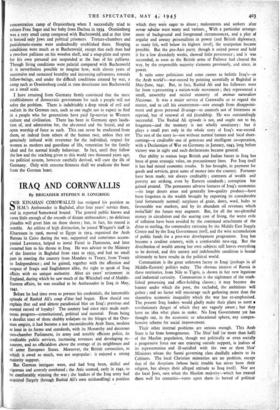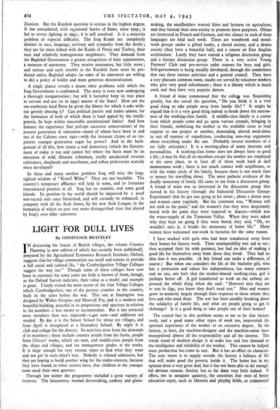IRAQ AND CORNWALLIS
By BRIGADIER STEPHEN H. LONGRIGC
SIR KINAHAN CORNWALLIS has resigned his position as H.M.'s Ambassador in Baghdad, after four years' service there, and is reported homeward bound. The general public knows and cares little enough of the records of distant ambassadors ; no delirious plaudits will greet him on these shores ; but, in fact, his record is notable. An athlete of high distinction, he joined Wingate's staff in Khartoum in 1906, moved to Egypt in 1914, organised the Arab Bureau in Cairo during the war, supported and sometimes accom- panied Lawrence, helped to instal Faisal in Damascus, and later escorted him to his throne in Iraq. He was adviser to the Ministry of the Interior in Baghdad from 1921 to 1935, and had no small part in steering the country from Mandate to Treaty, from Treaty to Independence ; and he gained, together with the affection and respect of Iraqis and Englishmen alike, the right to speak of Iraq affairs with an unique authority. After six years' retirement in England, during which he saw much of the Whitehall end of Middle- Eastern affairs, he was recalled to be Ambassador in Iraq in May, 1941. - Before he had time even to present his credentials, the lamentable episode of Rashid Ali's coup d'etat had begun. How should one explain that sad and almost paradoxical blot on Iraq's previous and normal record of loyalty? The country had since 1921 made enot- mous progress—constitutional, political and material. From being a derelict tract of three shabby wilaiyats on the fringes of the Otto- man empire, it had become a not inconsiderable Arab State, modern at least in its forms and standards, with its Monarchy and decorous two-chamber Parliament, its army and notably efficient police, its creditable public services, increasing revenues and developing re- sources, and an officialdom above the average of its neighbours and of some European States. Moreover, the British connection, to which it owed so much, was not unpopular: it enjoyed a strong
majority support. • But German intrigues were, and had long been, skilful and vigorous and scarcely combated ; the Axis seemed, early in 1941, to be comfortably winning the war ; the leaders of the Iraq army had acquired (largely through Rashid Ali's own mishandling) a position
which they were eager to abuse ; malcontents and seekers after novae t4bulae were many and various.. With a particular arrange-
ment of background and foreground circumstances, and a play of angular and uneasy personalities in power (and British diplomacy, as many felt, well below its highest level), the usurpation became
possible. But the pro-Axis party; though it seized power and held it for a few disorderly weeks, showed little persistence ; and it was succeeded, as soon as the British arms of Paiforce had cleared the way, by the responsible majority elements previously, and since, in power.
It suits some politicians and some causes to belittle Iraq's—or the Arab world's—war-record by pointing scornfully at Baghdad in May-June, 1941. But, in fact, Rashid Ali and his followers were far from n.presenting a nation-wide movement ; they represented a small, unworthy and misled minority of animae naturaliter Nazionae. It was a major service of Cornwallis so to regard the matter, and to call his countrymen—sore enough from disappoint- ment and gross personal ill-usage—to counsels not of bitterness or reprisal, but of renewal of old friendship. He was outstandingly successful. The Rashid Ali episode is not, and ought not to be, forgotten—and the memory is not wholly unsalutary : but it plays a small part only in the whole story of Iraq's war-record. The rest of the story is—not without normal human and local short- comings—a creditable one of generous and intelligent co-operation, with a Declaration of War on Germany in January, 1943, long before victory was in sight and such declarations became general.
Our ability to station large British and Indian forces in Iraq has been of great strategic value, on precautionary lines. For Iraq itself it has had mixed economic results. It has brought, in payment for goods and services, great sums of money into the country. Fortunes have been made, not always creditably ; contrasts of wealth and poverty are striking, even by Eastern standards ; corruption has gained ground. The permanent adverse features of Iraq's economics —its large desert areas and generally low-quality produce—have been forgotten in the wealth brought by exporting its considerable (and fortunately normal) surpluses of grain, dates, wool, hides to favourable war markets, and by its abundant oil revenues which insha'llalt! the future may augment. But, for all the too-plentiful money in circulation and the soaring cost of living, the worst evils of inflation have been avoided by the continued attachment of the dinar to sterling, the commodity rationing by the Middle East Supply Centre and by the Iraq Government itself, and the wise accumulation of public funds for a post-war development programme. Iraq has become a creditor country, with a comfortable nest-egg. But the distribution of wealth among her own subjects still leaves everything to be desired, and this uneasy and indefensible condition is bound ultimately to have results in the political world.
Communism is the great unknown factor in Iraqi (perhaps in all Middle-Eastern) politics today. The obvious interest of Russia in these territories, from Nile to Tigris, is shown in her new legations and industrial curiosity. Communism is the nightmare of the estab- lished possessing and office-holding classes ; it may become the banner under which the poor, the excluded, the ambitious will gather ; and no factor will encourage such gathering more than the shameless economic inequality which the war has re-emphasised. The present Iraq leaders would gladly make their plans to meet a revolutionary danger of which they arc vaguely aware ; but they have no idea what plans to make. No Iraq Government yet has thought out, in the economic or educational sphere, any compre- hensive scheme for social improvement.
Their other internal problems are serious enough. This Arab State is far from homogeneous. The Shia' half (or more than half) of the Muslim population, though not politically or even socially a progressive force nor one enjoying outside support, is jealous of its representation and ill-satisfied with the two or three Shia' Ministers whom the Sunni governing class dutifully admits to its Cabinets. The local Christian minorities are no problem. except that of the Assyrians (whose basic trouble has never been their religion, but always their alleged attitude to Iraq itself). Nor are the local Jews, save when the Muslim majority—which has treated them well for centuries—vents upon them its hatred of political
Zionism. But the Kurdish question is serious in the highest degree. It has smouldered, with occasional bursts of flame, since 1919 ; it led to severe fighting in i943 ; it is still unsolved. It is a minority problem of especial difficulty. The Iraq Kurds are completely distinct in race, language, territory and sympathy from the Arabs ; they are far more linked with the Kurds of Persia and Turkey, their near and relatively homogeneous neighbours. They demand from the Baghdad Government a greater recognition of their separateness, a measure of autonomy. They receive assurances, but little more ; and serious and early trouble in the Kurdish liwas must be pre- dicted unless Baghdad adopts (as some of its statesmen are willing to do) a policy of bolder and more generous decentralisation.
A single glance reveals a dozen other problems with which the Iraq Government is confronted. The army is even now undergoing
a thorough reorganisation ; but will it hereafter keep its true place as servant and not (as in 1941) master of the State? How can the too-exuberant local Press be given the liberty for which it asks with- out grossly abusing it? Can political parties and trades unions, for the formation of both of which there is loud appeal by the intelli- gentsia, be kept within reasonable constitutional limits? And how balance the experience (but perhaps excessive conservatism) of the present generation of statesmen—many of whom have, been in and out of the Cabinet since 192I—with-the insistent claims of an im- patient younger generation eager for power? And in the back- ground of all this, how create a real democracy (which the Govern- ment of today is not and cannot be) where the basis must be an electorate of wild, illiterate tribesmen, totally uneducated riverain cultivators, shepherds and marshmen, and urban proletariats scarcely more developed?
In these and many another problem Iraq will miss the long- sighted wisdom of " Kom'l Wilas." They are not insoluble. The country's temporary affluence will help in some, and its fortunate international position in all. Iraq has no enemies, and some good friends. Its position in the world should be improved by a good war-record only once blemished, and will certainly be enhanced, in company with all the Arab States, by the new Arab League, in the formation of which no part was more distinguished than that played by Iraq's own elder statesmen.



























 Previous page
Previous page